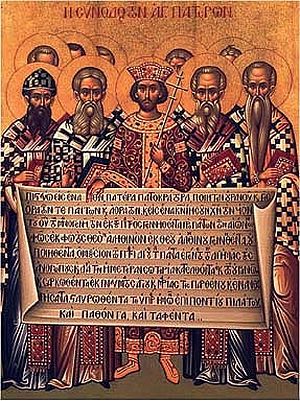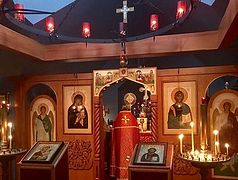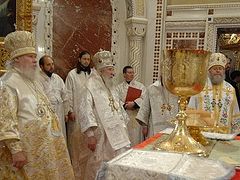The Orthodox Christian believer has been distinguished throughout history by his love for his true faith, believing that we can reach God through truth. The feast day of the true Orthodox believer does not take place through boasting in past achievements, but in repentance for his failure to live all the realities of his faith. This is the feast day of the Orthodox believer—to experientially live the dogmas of faith in Jesus Christ.
On the first Sunday of Holy Lent all Orthodox faithful celebrate the Sunday of Orthodoxy. What does this celebration mean? It means the triumph of the Church over all heresies that existed throughout history and against which it directly fought, for the Orthodox faithful did not easily receive the truth to which they adhere, but it was handed down through the struggle of the holy fathers, confessors and martyrs. This is the strength of the Church, which has always watched over its faith and holy dogmas against all foreign teachings corrupting its sacred entities.
This faith is a pledge handed down to the Orthodox believer and he will be asked to hand it back in the same form he received it (1 Cor. 11:23). This was expressed by St. Paul the apostle when he said: I have fought a good fight, I have finished my course, I have kept the faith: Henceforth there is laid up for me a crown of righteousness (2 Tim. 4:7-8).
Every time the Church triumphs over any heresy it is a considered a celebratory feast for Orthodoxy. Such triumphs used to be added by the Church to the Sunday of Orthodoxy while casting anathemas over those who have opposed and corrupted its teachings. Thus, the Sunday of Orthodoxy is not limited anymore to a specific time period, even though we celebrate it on a specific day every year, but it has become a firm symbol of the Church’s struggle and its victory over heresies and foreign teachings that have always existed.
The discernment of the faith of the apostolic Church, given to the world on Pentecost, from the perverted faith of heretics which corrupts the teachings of the apostles has been expressed by the word “Orthodoxy,” which means right glory or the right faith.
Orthodox dogmas lead us to truth
The dogmas, the faith, the Church, and Tradition, or “handing over,” are all topics that have their honorable place in the Orthodox mind; all of these testify to the one faith that the Church has lived since its inception. The faith unifying us with the Lord Jesus Christ must be one, as the Church is one. The faith is built on dogmas; when dogmas change, the whole faith changes.
Orthodoxy has preserved the faith of the early Church in the same form it received it from the beginning; it neither added to it nor subtracted from it even a letter. Additions and subtractions in matters relating to the faith are equivalent. The Church has understood the saying in the book of Revelation about he who adds to or removes from this book as applying to anybody who adds or removes any of the dogmas of the New Testament: For I testify unto every man that heareth the words of the prophecy of this book, If any man shall add unto these things, God shall add unto him the plagues that are written in this book: And if any man shall take away from the words of the book of this prophecy, God shall take away his part out of the book of life (Rev. 22:18-19).
In order neither to increase nor diminish the content of this book, every true Orthodox believer struggles with all his might to enter into deep knowledge of the Orthodox faith. Faith in Jesus Christ is not an abstract or intellectual matter, but is an ongoing pursuit to enter into the mystery of Jesus Christ. We cannot be saved without the truth. This truth, which has been entrusted to each Orthodox Christian, especially bishops and priests, compels them to precisely preserve the mystery of the Orthodox faith, to be a solid part of the living body of Christ, of his Church. The bishop himself becomes “the Church” when he submits his mind and will to the Church’s faith and struggles even to the shedding of his blood to preserve its dogmas. Only then can the pure love of Jesus Christ burn within him—love that is moved by the grace of the Holy Spirit. True love proceeds from the true faith, otherwise becoming a manmade and corrupt love moved by the passion of self-love and vainglory.
The Orthodox believer despises transgression
Inasmuch as the faithful Orthodox Christian loves truth he equally despises transgression. We have reached an evil time in history, which Holy Scripture has prophesied, in which dwells the spirit of Antichrist. This is the greatest heresy of our current age—the spirit of the world, or evil globalization, which spreads the spirit of lukewarmness towards the Orthodox faith and dogmas. The spirit of lukewarmness toward dogma and faith is a sign that will precede the coming of the Antichrist—the latter days prophesied in the Holy Scriptures that will constitute the age of apostasy from true faith and dogmas. According to the Holy Scriptures, this age takes inspiration for its ways and teachings from demons: Now the Spirit speaketh expressly, that in the latter times some shall depart from the faith, giving heed to seducing spirits, and doctrines of devils (1 Tim. 4:1).
We read in the life of Saint Pachomius that while conversing with some monastics he noticed a terrible, foul smell filling the place. After they had all left he asked God to inform him of the reason for the smell, and God made it known to Saint Pachomius through an angel that “dogmas of ungodliness were emanating from their souls.”
The faithful Orthodox Christian lives in spirit and truth
Knowledge of Orthodox truth is not a theoretical exercise but a way of life that we follow in the Church’s liturgical life. Therefore, the life of piety in the Church is closely related to dogma. If our dogmas are true and correct, then all of our faith is correct, and this correct faith preserves the life of piety from perversion and change. We humbly believe that the spiritual life and struggle are the special attributes of Orthodoxy that have preserved it from any perversion or change.
Orthodox Tradition is the tradition of the heart’s purification, through tedious struggle against passions, which constitute a barrier between us and the knowledge of the living God. It is the tradition of the monastic life, which wipes out sin from the heart and makes man able to carry Christ’s yoke and to behold His glory. Monasticism, including fasting, prayer, vigils and practicing Christ’s commandments is in the end the only way to reach certain knowledge of the living God with the active participation of both soul and body. St. Gregory Palamas says, “Saying something about God does not equate to an encounter with God” (Triads 3.42). Inasmuch as we purify ourselves from our corrupt dispositions, so much do we enter more into the depth of the mystery of Orthodoxy that preserved our God alive, for heretics murder this living God, transforming Him into an idol.
Pride, being the cause of the first man’s fall, remains the ongoing reason for our falls. The hidden cause of any heresy is first and foremost pride. But Orthodoxy is like its Christ—nobody can accept it except by humility. The humble accept truth without revolting against it when it opposes their opinions and beliefs. The true humble person searches for truth and finds it because the Lord does not let him go astray and lose his salvation.
Orthodoxy is our everlasting city
Orthodoxy is the true Church of the true Christ, not a Church of vain nationalities. We are Orthodox before being Antiochians or Greeks or Russians or Romanians… What unites us is not geographic nationalism but Orthodox truth. It is what makes us one, united through the bond of faith with every Orthodox Christian in this world, and it is the eternal bond that unites us all together after death with Christ in the world to come.
Many want an Antiochian unity, but they seek to unify Antioch in its transgressions and wickedness rather than in its repentance. By doing so they war against Orthodoxy because they mix truth with falsehood. Antioch has been torn out by heresies and all sorts of innovations, but Orthodoxy is the one Church that has been neither divided nor scattered. It is the steadfastness of Orthodoxy in its faithful alone that preserves Antioch from becoming a neo-Babylon.
Conclusion
The world needs Orthodoxy the same as it needs water and air. It is the straight and narrow path to the true Christ, because the dogmas of the faith are developed neither by the universities and institutes of this world nor by the science of this age, but by the power of the Holy Spirit. The holy fathers, being filled with the grace of the Holy Spirit, were sanctified and accurately defined its dogmas along with the Church’s entire liturgical life. All that is in Orthodoxy was drawn from Divine grace working directly in the Church; all that is in it came along through the struggle of its fathers to protect and preserve the true faith in Christ, through the tears of their repentance, their long prayer vigils and their many fasts and prostrations. This is true dogma, this is the Orthodox faith—it is what keeps Divine grace in this depressed world, that it neither die in its sin nor vanish in its wickedness.
We are nothing but Orthodox.





